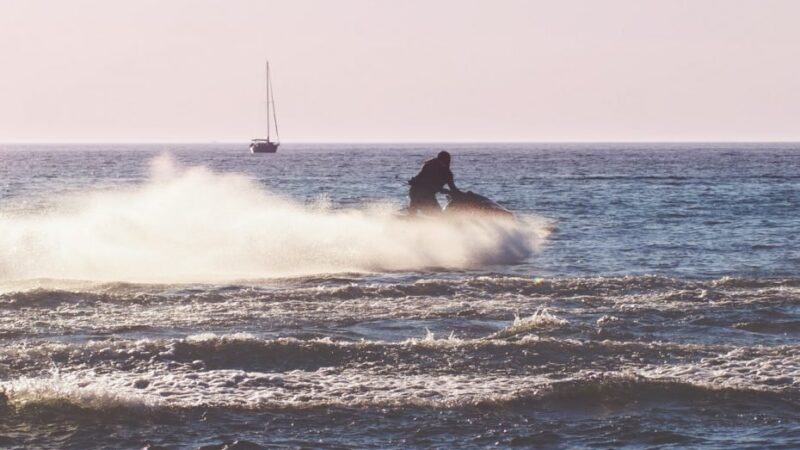A letter from a federal agency about dangers to local fish habitat could complicate rulemaking process
The Oregon State Marine Board is moving forward with a proposal members believe is a compromise between the wishes of proponents and detractors of wakesurfing in the Newberg Pool section of the Willamette River.
During a meeting Wednesday, Jan. 22, the board unanimously voted to allow staff to develop rulemaking language around a proposal that would shrink the number of wakesurfing zones from five to two and place the zones near the ends of the pool, which is roughly from Newberg to West Linn.
The current rules include zones for wakesurfing (which causes bigger wakes than other towed watersports) but also allow other activities like wakeboarding and paddling in the same sections. But the new proposal would ban other activities in wakesurfing zones.
While certain homeowners in current wakesurfing zones complained of heavy congestion near their docks last summer, the zones selected were chosen in part because there are no docks along either section. The zones span about three miles combined.
Once staff completes a draft of the new rules, it will be posted and available for public comment for at least 30 days, starting sometime in the next couple months. The board then may approve the changes at a meeting in April.
Other rule changes the board considered but decided not to pursue included banning wakesurfing completely in the Newberg Pool, issuing a 3,500-pound weight limit for towed watersport boats, and implementing minor tweaks to zonal boundaries.
The Rules Advisory Committee that the board created to inform the rulemaking decision reached more of a consensus on the option the board selected than any other alternative considered.
“I believe that these large wakes are causing damage to the shoreline. I still am concerned about it ,but I also agree that there has to maybe be a compromise,” committee member Evelyn Galloni said at a meeting earlier this month.
Marine Board Director Larry Warren, for his part, said the new rules would be easier to enforce than the current ones, which have created congested sections of the river that host a wide variety of users.
“If someone was wakesurfing in the red zone, it would be a pretty obvious stop (for law enforcement). It gets at some of the enforceability concerns,” Warren said.
Despite the step forward, the board’s decision comes with one glaring caveat.
Prior to the meeting, the agency hadn’t had much chance to consider a letter that a representative of the National Oceanic and Atmospheric Administration (NOAA), which is a part of the U.S. Department of Commerce, sent to the board asking members to more strongly consider the effects waves can have on chinook salmon and steelhead when choosing rule changes.
“In NMFS’ (National Marine Fisheries Service, which is a division of NOAA) experience, noise and wave actions are frequently a threat to juvenile salmon and steelhead,” wrote Kim Kratz, the NOAA assistant regional administrator in the West Coast Regional Office. “Therefore, we expect that wakesports are likely to have a significant adverse impact on those listed species and their critical habitats by injuring and killing individual fish when, for example, the surge and wakes caused by artificial waves from passing boat and wake sport participants wash juvenile fish onto the shore, or otherwise modify or degrade PBFs (physical and biological features) in ways that injure or kill fish by significantly impairing their essential behavior patterns.”
The letter also asked the board to either comply with the Endangered Species Act (ESA) by avoiding passing policies that could further harm salmon and steelhead or ensure that the harm is “subject to an exception or exemption under the ESA.”
“We also have a responsibility to enforce the prohibitions of the ESA, which makes it unlawful for any person to harm threatened salmon and steelhead, through activities which injure or kill protected fish
or interfere with the func-
tion of their habitat,” Kratz wrote.
The letter was sent just a few days before the meeting and the board advised staff to chat with the federal agency about their concerns. Josh Mulhollem, the Marine Board policy and environmental program manager, said in an interview that the board will heavily weigh those discussions when deciding whether to approve changes.
He also said that if the board were to decide to change course, rule changes likely would not be signed into law until 2021 because of the elongated rulemaking process and the difficulty and confusion that changing rules during boating season creates.
In that case, the current rules would remain in effect this coming summer.
However, he also said that if the board decides to approve the changes, there likely wouldn’t be any consideration of new rules for at least two years. The board passed rule changes in 2019 and is on the verge of passing changes again this year.
“They’ve (the board) also indicated that to evaluate the effectiveness of the rules, it’s sometimes difficult to do so in a short period of time,” Mulhollem said. “I foresee if these changes are made in April, there likely won’t be a reg-
ulatory change in the New-
berg Pool for some period of time.”
You count on us to stay informed and we depend on you to fund our efforts. Quality local journalism takes time and money. Please support us to protect the future of community journalism.







Recent Comments